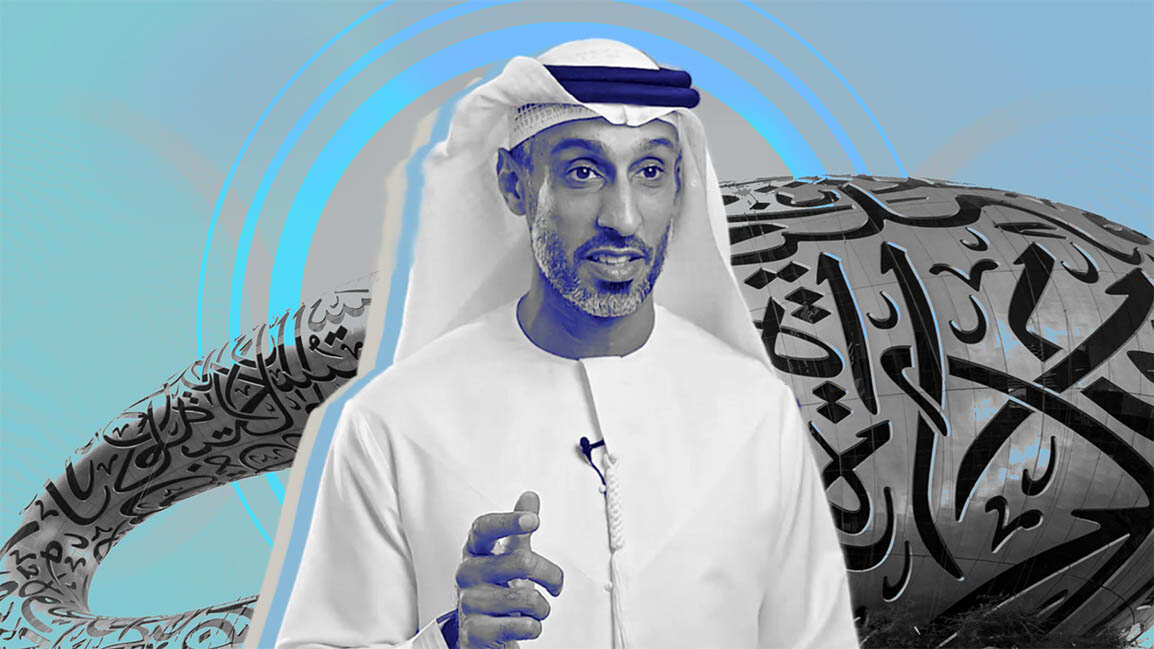- | 9:00 am
Humans are critical to the past, present and future
In an exclusive interview, H.E. Khalfan Belhoul, CEO of the Dubai Future Foundation, tells us how technology can be leveraged to solve the world's most pressing issues.

What does the future look like? What will be the role of technology in shaping trends 200 years on? Which emerging tech is worth placing a bet on? With the already rapid pace of technological innovation about to get a lot quicker, these are some questions I had when I sat down for an interview with H.E. Khalfan Belhoul. After all, only a few have job descriptions as future-centric as Belhoul’s.
Operating out of the Office of the Future, where he heads the Dubai Future Foundation (DFF) and the recently launched Museum of the Future, one of Belhoul’s primary roles involves leveraging futuristic solutions and technologies to address the most pressing problems of the day.
“The museum is only the start of the journey. It’s the start of [igniting] imagination in visitors to ensure that we take them through an immersive glimpse of the future, where they can dare to dream about great ideas, contribute to a better future for everyone, and go through a journey of several topics that talk about what opportunities and challenges lie ahead and what we can do about them.”
WATCH THE VIDEO HERE
In many ways, the DFF’s mandate reflects the nation’s leadership, he says. “The founding fathers of the UAE have made courageous bets in the past that were extremely ambitious but have reflected major rewards and benefits for the union. A courageous mindset requires a lot of risk-taking. This mindset of taking big risks for humanity’s benefit is the vision reflected at the Dubai Future Foundation.”
MAKE WAY FOR THE METAVERSE
The DFF has several initiatives in the pipeline, including embracing the metaverse — the inaugural Dubai Metaverse Assembly set to take place on September 28-29. “The metaverse has so much value, but at the same time, there’s plenty of risk in need of mitigation.”
Some questions under exploration include, he says: “Health and mental well-being in the metaverse, and what happens to risks between transactions?” Those things need to be understood as they can reap immense rewards.
As emerging tech requires major collaboration, he is looking forward to working with the private sector and different governments worldwide. Explaining his vision further, he says, “If we were to see a metaverse to succeed, there need to be sets of metaverses creating a multiverse completely synchronized and well-governed to make this project a success. We’re excited to be embarking on it.”
To create a progressive future for everyone, DFF invests a significant amount in researching mega trends and opportunities in existing ecosystems. Compiling all these research findings guide major decisions of DFF’s work, Belhoul notes. “We present an annual report defining 50 opportunities that indicate what trends will rule the future.”
EMBRACING FAILURE AS A MEANS TO SUCCEED
Strategy is key to staying ahead of the future, but so is challenging oneself. Belhoul has a simple formula: “We challenge ourselves by believing the sky’s the limit when it comes to innovation.”
No matter what stage the idea is in, Belhoul says, it’s crucial to have an ideation hub, like the DFF, without boundaries or judgments and “indicative of our willingness to accept all ideas”. He adds that the DFF is creating an open environment and an open door policy.
“We are fortunate to be in an ecosystem and a region where failure has acceptance because we understand the reward that comes with it.”
The nature of DFF, he adds, is to focus on embracing failure. “Here, we are thinking of ambitious ideas. The failure rate is high because you’re talking about the future, which has a grey area.”
RULING IN THE FOURTH INDUSTRIAL REVOLUTION
As Industry 4.0 captures the world’s attention, Belhoul says, agility is the game’s name, alongside the acceptance of risk, collaboration, and inclusion.
For an organization to be prepared for Industry 4.0, it is essential to prioritize innovation. “Organizations must create a safe yet promising environment that welcomes and tests new ideas.”
Partnerships are equally important to Industry 4.0, he says. “Whether it’s programs, projects, investments, or different ideas creating a better future for everyone, understanding the future global challenges through our robust foresight team can help us innovate.”
Given the rate of technological disruption witnessed during the pandemic, it’s inevitable, he says, to adopt artificial intelligence, machine learning, robotics, and autonomous mobility.
Pausing for a second, he says, “but humans are an important factor of the past, the present and will always remain an important factor of the future.” The challenge is to use technology to solve the day’s problems, such as food security, climate change, and socio-economic growth.
It’s all about creating the right environment, regulations, and policies for technologies to grow and mitigate the risks that can come from them. The DFF plays a key role in creating testing environments for all ideas, predominantly through the Regulations Lab. “By identifying the successful ones, we create policies and programs for them to grow,” he says.
Belhoul says that cross-border transactions between ideas are important to create an inclusive future. “Scalability of ideas is no longer confined to a boundary of one nation.”
DRAWING INSPIRATION
Despite the uncertainties of the future, Belhoul says he focuses on adopting a positive mindset. “Being positive helps my team and I adjust to challenging moments. Embracing a positive mindset picks you up from stressful moments. It ensures you understand that no matter what you are going through, some people are facing even more challenging moments.”
The grounding thought of shared human experiences has been a piece of advice he has inculcated throughout his life. “You feel appreciative, thankful, and keep going.”







































